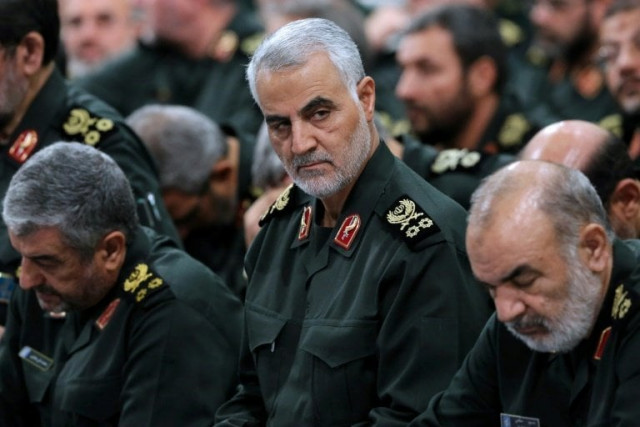Killing Soleimani: Trump acted where other US leaders saw big risks
He was killed in a drone strike just outside the Baghdad airport shortly after flying in to meet with Iranian allies

Maj Gen Qaseem Soleimani (Center): PHOTO: AFP
Trump's predecessors thought killing Qasem Soleimani, the head of the Islamic Revolutionary Guard Corps' Quds Force, would risk another war in the region while US troops were bogged down in Iraq and Afghanistan.
But after three years of vying with Soleimani's proxies with deadly results, culminating in this week's assault on the US embassy in Baghdad, the Pentagon decided that if it did not act, "we would be culpably negligent," Joint Chiefs Chairman General Mark Milley said.
Israel on alert for fallout after US killing of Iran army commander
Soleimani was killed in a drone strike just outside the Baghdad airport shortly after flying in to meet with local Iran allies.
The US had "compelling" information of looming threats from Soleimani's operations that were much greater in "size, scale, scope" than in the past, Milley said.
"Is there risk? Damn right there is risk," Milley said. "The risk of inaction exceeded the risk of action," he said.
Killing Soleimani was no small decision, said Max Boot, a national security expert at the Council on Foreign Relations.
"His death makes him the highest-ranking foreign military commander assassinated by the United States since the shoot-down in 1943 of an airplane carrying Admiral Isoroku Yamamoto," the Japanese architect of the December 1941 Pearl Harbor attack, Boot wrote in the Washington Post.
Yet neither president George W. Bush or Barack Obama was willing to do it.
"What always kept both Democratic and Republican presidents from targeting Soleimani himself was the simple question: Was the strike worth the likely retaliation, and the potential to pull us into protracted conflict?" said CIA analyst-turned lawmaker Elissa Slotkin.
Killing Soleimani "has been discussed going back well over a decade," said Gil Barndollar, a Senior Fellow at the Defense Priorities think tank. Yet even Israel, known for its decapitation strikes on enemy threats, decided it wasn't worth the risk of war, he noted.
In 2007 Bush's special operations chief, General Stanley McChrystal, had a convoy carrying Soleimani from Iran into Iraq in his sights.
"There was good reason to eliminate Soleimani," he wrote last year. But McChrystal held off "to avoid a firefight, and the contentious politics that would follow."
General David Petraeus, the commander of US forces in the region in 2008, called Soleimani "truly evil."
But the two generals communicated indirectly to address some problems inside Iraq, where the Iranian exercised massive political influence.
"There was never an underestimation of the importance of his role," said Ned Price, a national security expert in the Obama White House.
"His footprint also extends to the West," said Price, noting the Quds can operate in Europe, South America, and even the United States, where they allegedly backed a 2011 assassination plot against the Saudi ambassador.
Trump changed course in 2018, setting a "maximum pressure" sanctions campaign against Tehran and pulling out of the nuclear deal Obama crafted, which had calmed some of the bilateral tensions.
The result has been a slow escalation of tit-for-tat actions, including over the past year attacks by Iran on oil tankers in the Gulf, shooting down a US drone, and a rocket attack on Saudi oil installations.
Trump's policy essentially benefitted Iran's hardliners like Soleimani, said Barndollar. "That only further increased his domestic sway," he said.
And his power mounted across the region: in the past few years Soleimani arguably set the political and military agenda in Syria, Iraq, and Yemen.
Will Fulton, an independent Iran expert, said that Soleimani was now likely seen as too dangerous.
"His remit and reach has expanded, and perhaps the Trump administration decided Soleimani's influence and ability to shape regional events was too great a threat to leave unchecked," he said.
Iran supreme leader vows 'severe revenge' for Soleimani killing
Still, others think that Trump, facing a reelection challenge this year and expected to go on trial for abuse of power in the Senate this month, may have wanted to demonstrate his toughness to US voters.
Analysts noted that earlier this week he tweeted about a notable foreign policy failure in the Middle East under Obama, the attack on a US mission in Benghazi, Libya that left four Americans dead.
"I think there's a big element of domestic politics tied up in this as well,' said Michael Desch, a professor at the University of Notre Dame.



















COMMENTS
Comments are moderated and generally will be posted if they are on-topic and not abusive.
For more information, please see our Comments FAQ